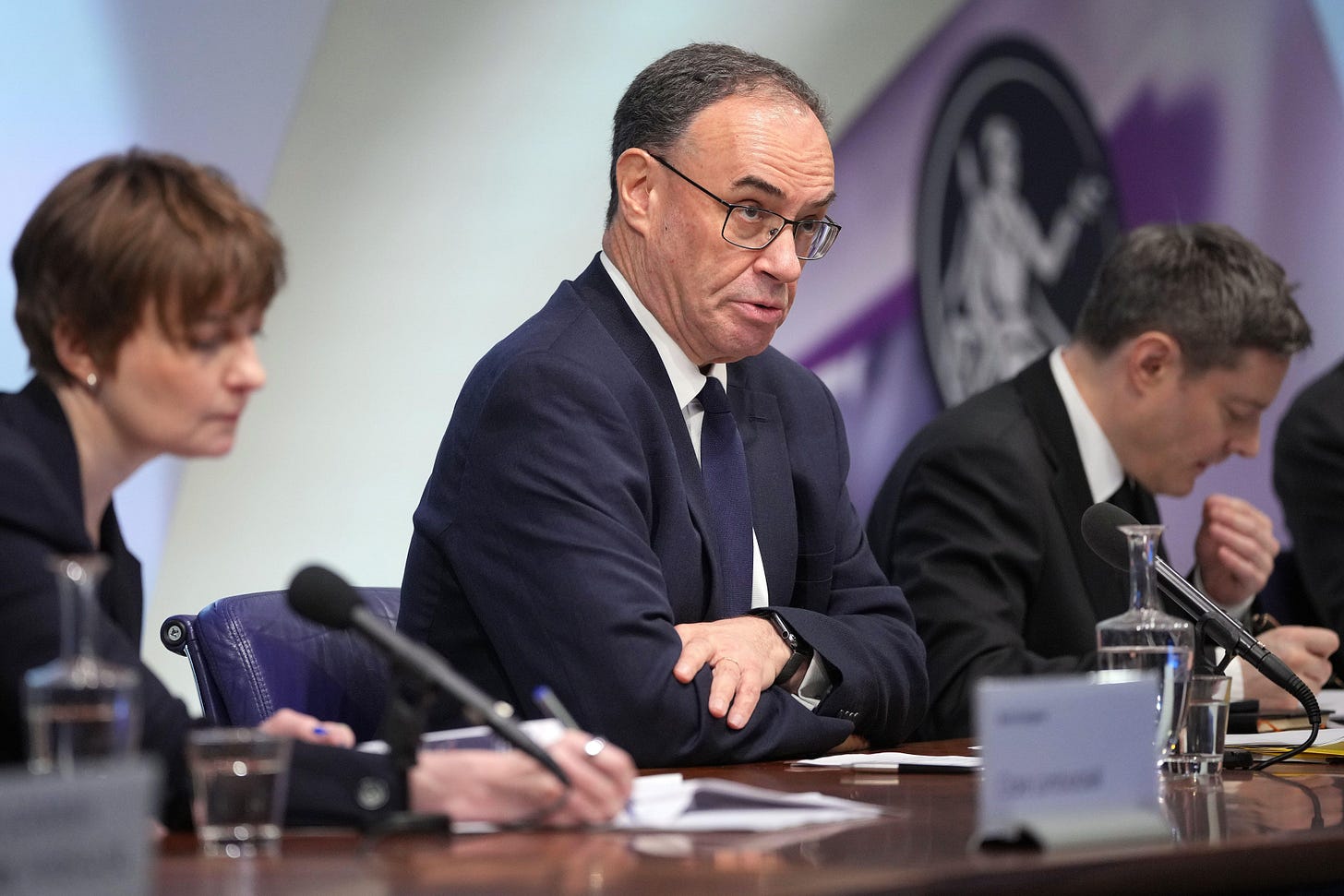The Bank of England’s interest rate cut today will have come as welcome, albeit expected, news for Rachel Reeves. Less welcome news for Britain’s beleaguered Chancellor is its accompanying growth forecast.
The BoE’s Monetary Policy Committee voted to cut interest rates from 4.75% to 4.5% - bringing them down to the lowest base rate since June 2023. Though the clear consensus to cut rates - with two of nine members even voting for a bumper half percentage point cut - also points to the increased pessimism surrounding the UK’s weak economy.
Today, Britain’s central bank downgraded its forecast for growth this year from 1.5 per cent to 0.75 per cent, adding that economic growth has been “broadly flat since March last year”.
In a blow to Reeves, the Bank raised concern over declining business and consumer confidence - and the firms who have “mentioned the Budget as a deterrent to investment”.
Today’s rate cut will make borrowing that bit cheaper, reduce the cost of business and home loans and encourage spending.
Though a big boost to business confidence will take more than one quarter-point cut, meaning Reeves will be desperately hoping this is the first in a series of cuts.
On this front, Governor Andrew Bailey offered no guarantee, choosing his words cautiously. Amid so much domestic and global uncertainty, the Bank will take a “careful and gradual” approach to future interest rate cuts as it weighs up a number of factors that could affect inflation, said Bailey.
Worryingly, inflation is set to rise again this year, by more than previously expected, peaking at 3.7 per cent and remaining above the Bank’s target of 2 per cent into 2027.
Last year, the Bank was forecasting slow growth but falling inflation. This new stagflationary prospect - of even slower growth paired with rising inflation - is a dismal one.
That inflation is on the rise again is largely down to global factors outside of the government’s control. While UK-specific issues such as higher water bills and bus fares have played a small part, by far the main driver is energy prices, which are up about 20 per cent on what had been anticipated several months ago, thanks to a chilly winter across Europe which has drained gas storage levels.
Another glaring global factor fuelling economic uncertainty is Donald Trump’s tariff threats. And it will certainly be another reason why Bailey is reluctant to commit to further rate cuts.
Even tariffs not directly imposed on Britain would hit the UK economy. Though when it comes to exactly how tariffs might affect UK inflation, it’s not a straight forward picture. They could create somewhat conflicting pressures.
On the one hand, tariffs could be inflationary. Economists widely believe that any tariffs Trump imposes on other countries will raise US costs, sparking a wave of inflation there that would force the Fed to keep interest rates higher for longer. If US interest rates stay high, that would be bad for the pound and in turn make Britain’s imported goods more expensive.
Conversely, if Trump’s tariffs unleash a world trade war that significantly reduces the amount of supply chains Britain has built up around the world, that would be bad news for both the supply and demand side of the economy. And could lead to deflation.
So, do we think more rate cuts are on the way? Quite possibly, but for now, fears that Britain is on the brink of stagflation means the Bank of England is walking a difficult tightrope.
Caitlin Allen
Deputy Editor
ON REACTION TODAY
Gerald Warner
Starmer has raised the SNP from the dead
Maggie Pagano
The British get a nosebleed when they get too successful
ALSO KNOW
Tesla sales plummet – Car sales data for January shows that sales of Tesla’s electric vehicles have plummeted across Europe as competitors with newer models gained on the EV maker and amid a consumer backlash over Elon Musk’s political activism. In France, Tesla sales fell by 63 per cent, despite total car sales in the country falling by 6 per cent and EV sales dropping by just half a per cent.
Trump doubles down on Gaza plan – US Secretary of State Marco Rubio has insisted that Donald Trump’s proposal to “resettle” Palestinians from the Gaza strip in neighbouring countries would only be “temporary,” while the US President himself claimed today that Israel will turn over the Gaza Strip to America once fighting ends and “no soldiers by the US would be needed.”
Britain handed Ukraine defence leadership role – The UK is set to take over from the US in leading a defence force of Kyiv’s allies, focussing on increasing Ukraine’s security. The Trump administration requested that Britain’s defence secretary, John Healey, convene the 26th meeting of the Ukraine Defence Contact Group in Brussels on Wednesday next week. The US Defence Secretary Pete Hegseth is still expected to attend the meeting.
Backlash over planned demolition of Grenfell Tower – Eight years on from the deadliest residential fire since the war, in which 72 people died, survivors and bereaved families have accused the government of “ignoring” their voices after deputy prime minister Angela Rayner announced that Grenfell Tower will be demolished. The Grenfell United group stated that Rayner “could not give a reason for her decision” for the demolition and has “refused to confirm how many bereaved and survivors” had been consulted.
FIVE THINGS
Beijing is preparing to take advantage of disruption. Yun Sun in Foreign Affairs on China’s Trump Strategy.
Kemi Badenoch is leading her party in the right direction on migration, writes Sam Bidwell in The Spectator.
With Germany’s election only weeks away, the centre-right CDU bet the house on cooperation with the far-right AfD. Ido Vock in Prospect.
Musk’s DOGE agents accessed sensitive personnel data, alarming security officials, reports The Washington Post.
Britain still acts as if it has money to burn – No politician has been honest about what it would take to reverse our economic decline, writes Jon Moynihan in The Times.






Yes. And it is going to get worse until the whole Net Zero bandwagon is not just stopped, but the whole decarbonisation scam has been eviscerated. We will have spiralling energy costs (with all that entails) until we have reliable, dispatchable and cost-effective power / energy.